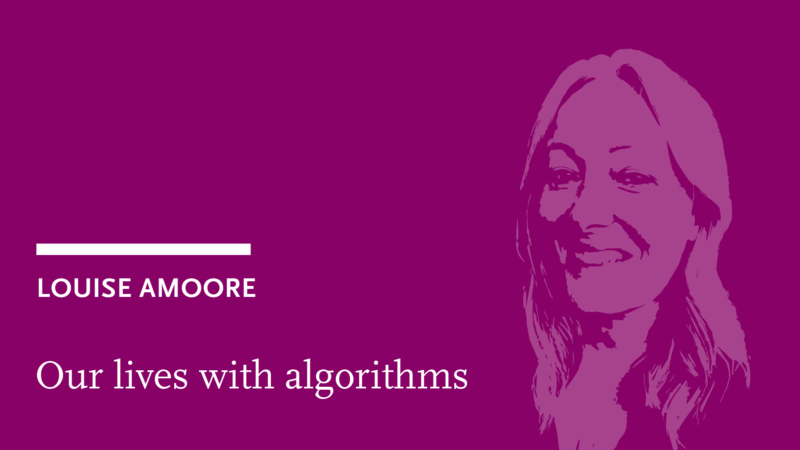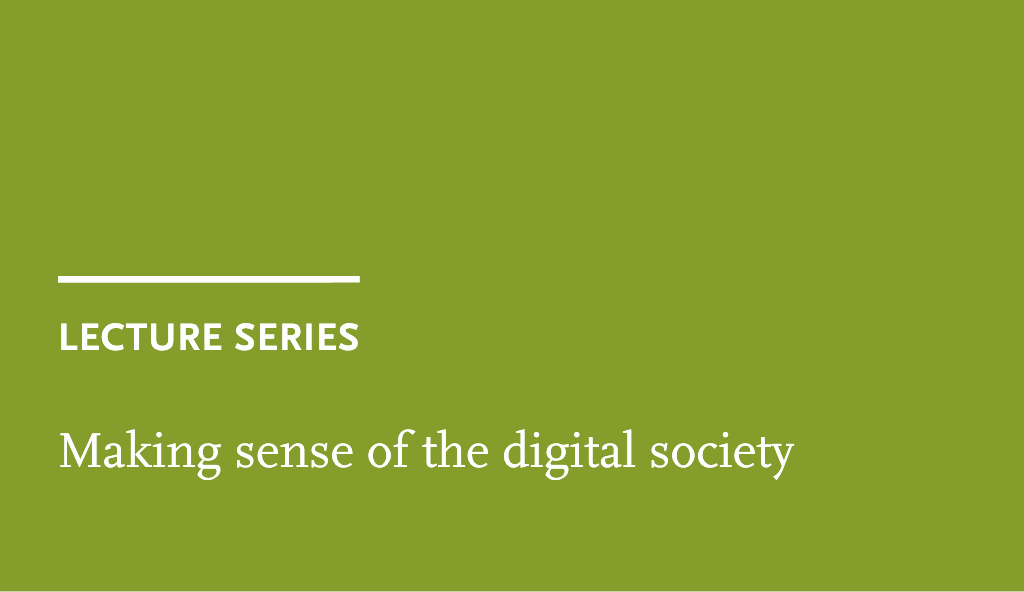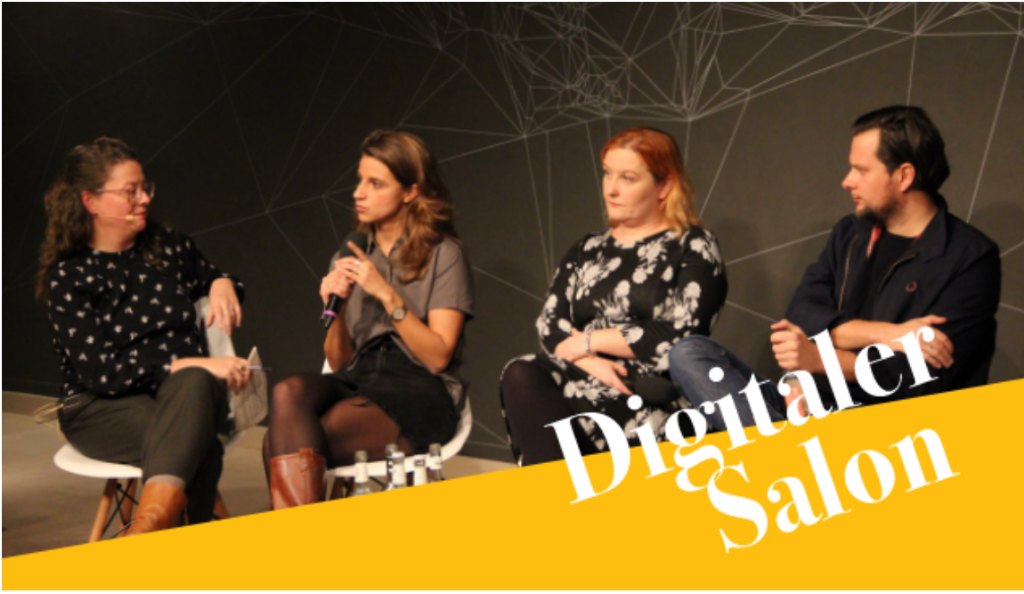
Louise Amoore: Our lives with algorithms
From detecting anomalies in the landscape of medical images to drone footage to the influencing of elections, machine learning algorithms are transforming radically how we make sense in society. Deep neural net algorithms condense the features of a scene to an output of meaning – such as “a man is throwing a frisbee in a park”, “a woman is standing at the border fence with a crowd in the background”, “the protesters are gathering in the city square”. They reduce the intractable difficulties and the undecidability of what could be happening in a scene into a single meaning that is informing decisions and actions. Is that hate speech or freedom of speech, are people pickpocketing or cuddling, is this a protestor or a terrorist?
In order to learn how to make distinctions, however, today’s algorithms require interactions with us and our data. The training and adaptation of algorithms take place through the attributes of our lives and the lives of others. This is problematic because the meaning of our relationships with other beings, how they come to make sense, precisely cannot be condensed. How do we begin to locate these aspects within the algorithm’s programme of sense-making in the digital society? Are there counter-methods available to us that resist the clustering of human attributes via machine learning? What remains in the digital society of that which is unattributable, that which cannot be translated into a single numeric output?
Louise Amoore: Our lives with algorithms
1 July 2019 | 7 pm | doors open 6.30 pm
HAU Hebbel am Ufer (HAU 1) | Stresemannstraße 29 | 10963 Berlin
Louise Amoore is Professor of Geography at Durham University, UK; she researches and teaches in the areas of global geopolitics and security. She has particular interests in how contemporary forms of data, analytics and risk management are changing the techniques of border control and security. Amoore has been awarded a Leverhulme Major Research Fellowship (2016-18) for her work on the ethics of algorithms. Her most recent book is The Politics of Possibility: Risk and Security Beyond Probability (Duke University Press, 2013).
Agenda
| 18:30 | Doors open |
| 19:00 – 19:15 | Welcome and introduction |
| 19:15 – 20:00 | Our lives with algorithms Louise Amoore (Durham University) |
| 20:00 – 21:00 | Moderated discussion and questions from the audience |
| 21:00 – 22:00 | Get-together |
The event will be held in English and simultaneously translated into German.
For press accreditation, please contact Florian Lüdtke.
This event will be recorded and broadcasted live. By signing up you consent to be photographed, filmed and/or otherwise recorded during the event and to the use of the content in connection with the promotion and public relations of the event.
Making Sense of the Digital Society
The current rapid pace of technological change creates enormous uncertainties – and thus the need for explanations that help us better understand our situation and shape the future. The Alexander von Humboldt Institute for Internet and Society (HIIG) and the Federal Agency for Civic Education (bpb) are therefore continuing the Lecture Series Making Sense of the Digital Society that was launched in 2017. The aim of the format is to develop a European perspective on the current processes of transformation and its societal impact. The first speaker of this year’s series was sociologist Eva Illouz, followed by Dirk Baecker and José van Dijck.
What our Twitter community said
@AmooreLouise: experts' role and self understanding will change through the collaboration with algorithms. "it becomes difficult to decide against the flow" #digitalsociety pic.twitter.com/ziTVBQqle9
— Jeanette Hofmann (@achdujeh) July 1, 2019
We should change our attitude to #algorithms Should an output of the algorithm determine a decision, our life?What are the other ways of reasoning when using #ArtificialInteligence in contrary to people’s opinions and decisions? @AmooreLouise @hiig_berlin @HAU123 #digitalsociety pic.twitter.com/NtT5CbElme
— Artur Olesch (@ArturOlesch) July 1, 2019
"Algorithms provide partial accounts. They should be part of decision-making processes, not THE decision-making process."
– @AmooreLouise on 'Our Lives With Algorithms' in Berlin @HAU123#digitalsociety @hiig_berlin pic.twitter.com/mS7wszFSfw— The WikiRate Project (@WikiRate) July 2, 2019
Deep learning algorithms can reduce and simplifying reality and also make mistakes. Here is an example of #AI mistakes where we can use attention to gain intuition into what the model saw @AmooreLouise @hiig_berlin #DigitalSociety pic.twitter.com/BwuobObyoi
— Artur Olesch (@ArturOlesch) July 1, 2019
Listening to @AmooreLouise speaking at @hiig_berlin’s #digitalsociety talks: instead of asking how we make machine learning algorithms do ‘good’, let’s consider how those algorithms are changing what is considered as ‘good’, she says
— Zara Rahman (@zararah) July 1, 2019
"Everytime an algorithm gives us an optimized output, let us ask: How could the output have been otherwise? What were the rejected alternatives?"
– @AmooreLouise bei @hiig_berlin #digitalsocietyEs bleibt wichtig, Digitalisierung kritisch & ethisch zu begleiten. #4genderstudies
— Fixing IT for Women (@FixITforWomen) July 1, 2019
Almost ran home to re-read both Butler and Foucault following some interesting insights on the future with #algorithms in our lives by @AmooreLouise #digitalsociety @hiig_berlin pic.twitter.com/6qZkODgGSI
— Sanja Bjelica (@sashabjelica) July 1, 2019
The theatre season is over, and we are very happy about the finale last night with @AmooreLouise @HAU123. Many thanks to everyone!
Stay tuned: Our #DigitalSociety lecture series in cooperation with @bpb_de will be continued by @ArminNassehi on 28 August: https://t.co/yFnqC7sMH8 pic.twitter.com/PlC5q2E1GB
— HIIG (@hiig_berlin) July 2, 2019
Registration
Bookings
Eine Anmeldung ist für diese Veranstaltung aktuell nicht möglich.
DIGITAL SOCIETY LECTURES
This high-profile lecture series thrives to develop a European perspective on the processes of transformation that our societies are currently undergoing.
DIGITALER SALON
Once a month we publicly discuss the impact of digitalisation on the society. Therefore we invite special guests and engage in a dialogue with the audience.
NEWSLETTER
Be the first to learn about our new events and exciting research results.












